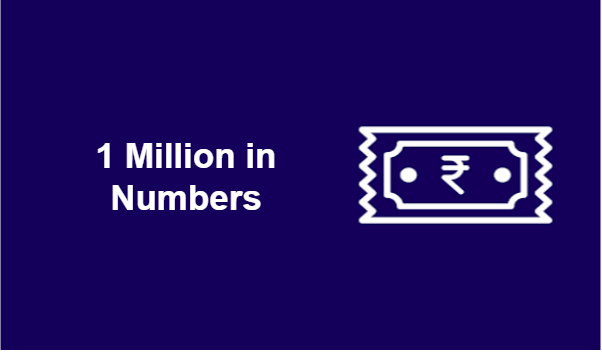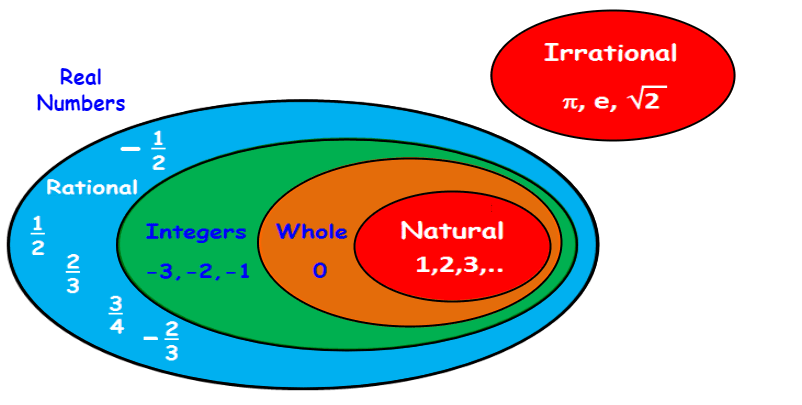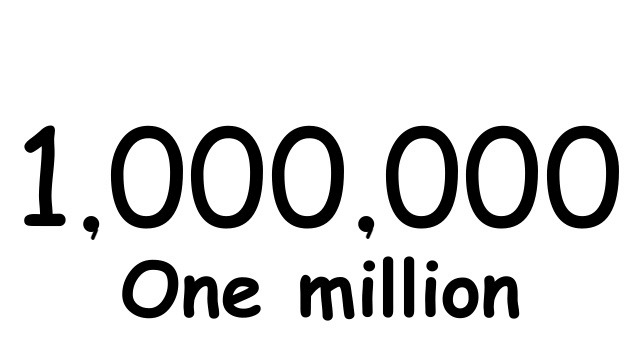1 Million in NumbersMathematics is a required field that plays an important role in our daily lives, and the study of numbers is one of the most fundamental aspects of mathematics. Numbers represent and quantify various quantities, such as time, distance, weight, etc. They help us understand and solve problems in diverse areas, from finance and engineering to science and technology. 
Numbers are used to perform various arithmetic operations, such as addition, subtraction, multiplication, and division. These operations form the basis of more advanced mathematical concepts, such as algebra, geometry, and trigonometry, which are essential for solving complex mathematical problems and real-world problems. Mathematics is also important in our daily lives because it helps us develop critical thinking and problem-solving skills. By studying mathematics, we learn how to break down problems into smaller, manageable parts and find solutions using logic and reasoning. These skills are valuable in mathematical contexts and many other aspects of life, such as decision-making and problem-solving. Before we move on to the calculation part, let's first briefly discuss numbers and million: What is meant by Numbers in Math?In mathematics, numbers refer to symbols representing a specific quantity or value. Numbers can be rational or irrational, whole or fractional, positive or negative, and real or complex. 
The most basic numbers are the counting numbers, also known as natural numbers, which are the positive integers used for counting: 1, 2, 3, 4, 5, etc. Zero (0) and natural numbers are all included in whole numbers. Irrational numbers cannot be stated as a fraction of two integers, but rational numbers may. In contrast to the square root of two, which is irrational, 1/2 is an example of a rational number. Real numbers, including irrational and rational numbers, can be written on the number line. Advanced mathematical concepts, like complex analysis, involve complex numbers composed of both real and fictitious portions. Numbers play a central role in mathematics and are used to quantify and describe various mathematical concepts, from basic arithmetic to advanced algebra and geometry. They are also used to solve mathematical problems and provide a way to represent and understand relationships between quantities. What is a Million?One million is a unit with a certain value, equaling 1,000,000 in numerical form. A large number is often used as a benchmark to express a significant amount of something. For example, one million dollars is a large amount, and one million people is a significant portion of the population. The concept of a million is relatively recent in human history. In ancient times, people used smaller units of measurement, such as dozens, hundreds, and thousands, to express large quantities. This was converted to advanced systems as the need for larger units of measurement became apparent. This was done only with the rise of commerce and industry on a large scale. There can be many instances where we can use the term 'million'. For instance: The term "million" in finance expresses large sums of money, such as a million dollars or a million pounds. Millionaires, or individuals with a net worth of one million dollars or more, are often considered wealthy. In economics, one million can represent a significant unit of production, such as a million units of a particular product or a million acres of land. In economic contexts, one million dollars is often used as a benchmark for wealth, and people with a net worth of one million dollars or more are often referred to as millionaires, just like in finance. In real estate, one million dollars is often used as a benchmark for the price of high-end homes, while in the stock market, one million dollars is considered a significant investment. In science, one million is used as a unit of measurement in various contexts. For example, one million molecules of a substance can be used in chemistry to study its properties and reactions. In astronomy, one million light-years express distances between celestial objects. In everyday life, the term "million" is used to express a very large quantity, often in a figurative sense. For example, someone might say, "I have a million things to do", to express feeling overwhelmed with tasks. In this context, the term "million" conveys the sense of a very large number rather than an actual count. Converting Million to NumbersOne million can be written in scientific notation as 1 x 10^6. Scientific notation is a convenient way to express very large or very small numbers and is widely used in various fields, including science, engineering, and finance. Expressing one million as 1 x 10^6 makes it easier to calculate and compare with other numbers. Simply put, 1 million is equal to 1,000,000 in numbers. Thus, we can conclude that: 1 million =1,000,000 
One million is a very large number and is often used as a benchmark to represent a significant quantity. ConclusionIn conclusion, one million is a significant number widely used in various aspects of life, from economics and politics to science and mathematics. It's a large number that can represent a substantial amount of something and can also be represented in different forms, such as scientific notation. While one million is a large number, it's still just a tiny fraction of other extremely large numbers, such as the estimated number of stars in the observable universe.
Next Topic1 Million in Rupees
|
 For Videos Join Our Youtube Channel: Join Now
For Videos Join Our Youtube Channel: Join Now
Feedback
- Send your Feedback to [email protected]
Help Others, Please Share









